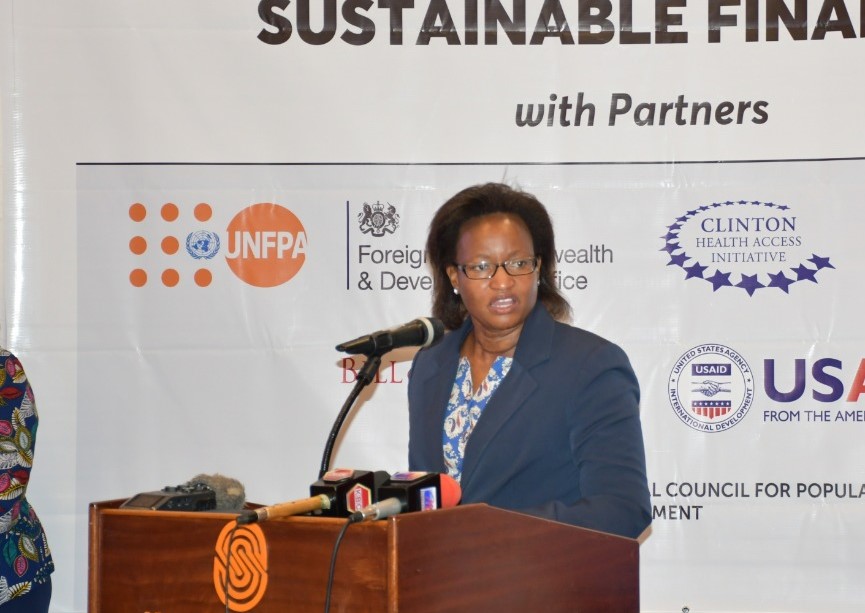The Government and donor community have renewed their commitment to a sustainable financing mechanism for the procurement of family planning commodities, a move that will see access to family planning commodities, valued at Sh.2.5 billion.
Ministry of Health Principal Secretary (PS), Susan Mochache, said that the government recognizes family planning as an essential component of both national and international development agenda.
She said that the government is therefore committed to achieve universal access to sexual and reproductive health and rights as part of Universal Health Coverage (UHC).
Mochache, speaking, Monday, at a Nairobi hotel, during the signing of a Memorandum of Understanding (MoU), said that the country is striving for zero unmet need for family planning information and services, with universal availability of quality, accessible, affordable and safe modern contraceptives.
“In October 2012, our Parliament approved the Population Policy for National Development, reaffirming reproductive health as a human right that should be accessible to all regardless of economic status. As a result of these efforts, we have experienced remarkable growth in uptake of modern family planning methods,” said the PS.

She added that part of priority is the elimination of preventable maternal deaths and morbidities.
“Kenya has the goal of improving the family planning indicators by enhancing the modern contraceptive prevalence rate among married women from the current 58 per cent to 64 per cent by 2030, as articulated in the family planning 2030 recommitments,” said Mochache.
She said that to sustain accessibility to quality health services, the country must invest in family planning commodity security, stewardship, information management and service delivery.
“This investment will result in enormous benefits, including averting unplanned pregnancies and reduction in maternal and neonatal mortality.
“In the financial 2019/2020, the National Treasury allocated Sh. 245 million and Sh.540 million through UHC fund and Sh. 863 million each in FY 2020/2021 and 2021/2022. This amount is expected to reach nearly Sh.1 Billion in 2022/2023,” said the PS.
She said that this is evidence that the government continues to meet its obligations, adding that it will continue leveraging the existing partnerships to bridge the financing gap that is a barrier to attainment of health agenda goals.
Mochache said that the Covid-19 pandemic has greatly impacted negatively on health systems, disrupting access to family planning information and services, as well as sexual and reproductive health generally.
“Despite this disruption, the need for family planning remains the same. For women in Kenya, family planning is critical, basic health care and as health systems shifted to prevent and treat people with Covid-19, it affected the resources available to fund other health programmes,” the PS said.
The PS thank The Bill and Melinda Gates Foundation (BMGF), The United States Agency for International Development (USAID) and The Foreign, Commonwealth and Development Office of the United Kingdom (FCDO) for the partnership that she noted has been invaluable in ensuring the services of public health concern continue uninterrupted.
She explained that investment in family planning services has had tremendous benefits to Kenyan women of reproductive age, saying that this year, 6.3 million Kenyan women are using a modern contraceptive method.
“As a result of this use, 2.4 million unintended pregnancies, 600,000 unsafe abortions and 6,100 maternal deaths have been averted. It is, therefore, prudent to continue investing in family planning as it is a low-cost investment that reaps high dividends,” said the PS.
Acting Director General (DG) for Health, Dr. Patrick Amoth, said that family planning has been proved to be a good investment, adding that for each dollar invested, it gives a dividend of 9.5 dollars in return. “it ensures that women and girls achieve their full potential”.
“Research shows that the total fertility rate in the country has reduced from the highs of 4.6 to currently 3.9,” said Dr. Amoth.
Dr. Amoth said that the government considers family planning as a very important intervention and it is covered under the Sessional Paper Number three of 2012, which highlights rapid population growth as a risk factor for achievement of vision 2030, if not properly managed.
By Joseph Ng’ang’a





